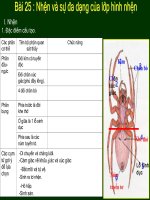Tải Giáo án tiếng Anh lớp 9 Tuần 27 sách mới - Giáo án điện tử môn tiếng Anh 9 theo tuần
Bạn đang xem bản rút gọn của tài liệu. Xem và tải ngay bản đầy đủ của tài liệu tại đây (180.34 KB, 8 trang )
<span class='text_page_counter'>(1)</span><div class='page_container' data-page=1>
<b>GIÁO ÁN TIẾNG ANH LỚP 9 </b>
<b> TUẦN 27</b>
<b>NĂM HỌC 2019 - 2020</b>
<b>Period: 22 </b> <b>Week: 27</b>
<b> UNIT 9: </b> <b>ENGLISH IN THE WORLD</b>
<b> PERIOD 7: LOOKING BACK & PROJECT </b>
<b>I. OBJECTIVES :By the end of the lesson, Ss will be able to review of what they</b>
have learnt in Unit nine(English in the world )
<b>II . TEACHER AND STUDENTS’ PREPARATION : </b>
<b> 1.Language content </b>
<b>Vocabulary : knowledge about </b>
<i><b>Grammar: </b></i>
2.Techniques: group work , pair work, communicative approach
3.teaching aids: posters, pictures
<b>III. PROCEDURES: </b>
<b>T’s & Ss’ Activities</b> <b>CONTENT</b>
<b>Vocabulary & Grammar</b>
For 1, 2, 3, 4 and 5, First have Ss work
independently. Then they can check their
answers with a partner before discussing
the answers as a class. However, tell Ss to
keep a record of their original answers so
they can use that information in their
self-assessment.
For exercise 3, T may ask some Ss to
write their sentences on the board and
give necessary correction.
<b>1. Vocabulary & Grammar</b>
1. first 2. accent 3. dialect
4. second 5. official
<b>2. </b>
1. am reasonably good
2. can also get by 3. picked up
4. am bilingual 5. also fluent in
6. can have a conversation
7. it’s a bit rusty 8. am quite bad at
9. know a few words
10. can’t speak a word
<b> 3. </b>
1. I can’t speak a word of French.
2. I picked up a few words of English on
holiday.
</div>
<span class='text_page_counter'>(2)</span><div class='page_container' data-page=2>
<b>Communication</b>
6. First, ask Ss to do the task individually
to choose sentences (A-E) to complete the
conversation. Then check their answers as
a class. Finally, ask Ss to practise the
conversation with their partners and call
on some pairs to act out the conversation
in front of the class.
4. I am bilingual in English and French.
5. I can get by in German on holiday.
6. My Russian is a bit rusty.
<b>4.</b>
1. accent 2. imitate 3. guess 4. look up
5. translate 6. mistakes 7. corrects 8.
communicate
<b>5 </b>
2. Those are the stairs where I broke my
arm.
3. There’s a shop where you can buy
English books and CDs.
4. The English couple who/that live next
to us can get by in Vietnamese.
5. There’s a shop near my house
which/that sells cheap DVDs.
6. Look up the new words in the
dictionary which/that has just been
published by Oxford University Press.
<b>Communication</b>
Key:
1. D 2. C 3. A 4. E 5. B
<b>IV- CONSOLIDATION & HOMEWORK:</b>
<b>1.Consolidation :</b>
ask Ss to complete the self-assessment. Identify any difficulties and weak areas and
provide further practice if necessary.
<b> 2.Homework : </b>
</div>
<span class='text_page_counter'>(3)</span><div class='page_container' data-page=3>
<b>Period: 23 </b> <b>Week: 27</b>
<b>REVIEW</b>
<b>Review3: UNIT 7 – 8 – 9 </b>
<i><b>Lesson 1 - LANGUAGE</b></i>
<b>I. OBJECTIVES: </b>
- This unit reviews the language and skills Ss have learnt in Units 7, 8, and 9. Help
Ss to recall the language and encourage them to contribute as much as possible.
<b> II . PREPARATION: sub -board, pictures, cassette </b>
<b>III. PROCEDURES: </b>
<b>Teacher’s and students’ activities</b> <b>Content</b>
<b>Pronunciation</b>
<b>Activity 1: </b>
- Review the use of falling, rising, and falling-rising tones
<i>in statement questions, finding out questions, making sure</i>
questions, and sentences to show new and known
information.
</div>
<span class='text_page_counter'>(4)</span><div class='page_container' data-page=4>
<b>Vocabulary</b>
<b>Activity 2: </b>
Have Ss do this exercise in pairs. Check the answers as a
class.
<b>Activity 3: </b>
Ask Ss to work out what kind of word each blank needs to
complete the sentence (e.g. noun, verb, adjective, etc.).
Then have Ss complete the sentences individually. T can
ask some Ss to write their answers on the board. Confirm
the correct answers.
<b>Grammar</b>
<b>Activity 4: </b>
Have Ss read the sentences. Then ask them to find the
mistake in each sentence, and write the corrected version of
the sentence. Now have Ss compare their answers in pairs.
Check their answers as a class.
1. B the Lake Hudson
2. C bunches
3. D will be
4. B the breakfast
5. C have
6. D the Vietnamese American
<b>Activity 5: </b>
Have Ss read the situations and write suitable sentences.
Call on two Ss to write their sentences on the board. T and
other Ss give comments. Correct any mistakes.
1. marinate; tender
2. garnish
3. stew
4. jet lag
5. excursion
6. full board
7. bilingual
8. official language
1. guide 2. reasonable
3. rusty 4. fluent
5. season 6. grated
7. steam 8. passer
→ Lake Hudson
→ cloves
→ would be
→ breakfast
→ has
→ a Vietnamese American
/Vietnamese American
</div>
<span class='text_page_counter'>(5)</span><div class='page_container' data-page=5>
<b>Activity 6: </b>
Elicit from Ss the relative pronouns and their uses (e.g.
who, whom, which, that, where). Ask Ss to do this exercise
individually and compare their answers with a partner.
Have some Ss read out their sentences. Correct any
mistakes.
<b>Everyday English</b>
<b>Activity 7: </b>
Ask Ss to discuss in pairs and choose the suitable
words/phrases to complete the talks. After checking their
answers, have some pairs act out the mini-talks.
2. You can become a tour
guide if you learn more about
history and culture.
3. If you want to improve
your English, you may go to
either The Sun or The Shine
language centres.
4. If I saw a fly in my soup, I
would tell the manager.
5. If I were you, I would go to
Song Nhi Resort.
1. Last holiday we stayed in a
resort which/that Mi
recommended.
2. I don’t like people who talk
loudly in public places.
3. The dishes which/that my
mother has cooked are so hot.
4. Last year I visited a small
town where/in which they
<i>filmed The Little Girl.</i>
5. Ms Mai was a teacher
whom/who I will never
forget.
1. C
2. A
3. E
4. B
5. D
<b>IV- HOMEWORK:</b>
</div>
<span class='text_page_counter'>(6)</span><div class='page_container' data-page=6>
<b>Period: 24 </b> <b>Week: 27</b>
<b>REVIEW (CONT)</b>
<b>Review 3: UNIT 7 – 8 – 9 </b>
<i><b>Lesson 2 - SKILLS</b></i>
<b>I. OBJECTIVES: </b>
This unit reviews the language and skills Ss have learnt in Units 7, 8, and 9.
Help Ss to
recall the language and encourage them to contribute as much as possible.
<b>II. PREPARATION: sub -board, pictures, cassette </b>
<b>III. PROCEDURES: </b>
<b>Teacher’s and students’ activities</b> <b>Content</b>
<b>Reading</b>
<b>Activity 1: </b>
<b>a Have Ss read the email and decide if the</b>
statements are true or false. Ask Ss to compare their
answers with a partner before giving T the answers.
Confirm the correct answers. Ask Ss to explain the
false statements.
<b>b</b> Have Ss do these exercises individually, check
their answers with a partner before giving the
answers to T. Two Ss can write their answers on the
board if time allows.
<b>Speaking</b>
<b>Activity 2:</b>
Ask Ss to work in groups to discuss the questions.
1. T
2. F (Nam, their classmate, also
joined the camp)
3. F
(they played the games before
lunch)
4. T
5. F (they let all the fish go)
1. They drew lots.
2. She comes from a school in
Tokyo/from Tokyo.
3. They won the first prize.
4. It’s for non-native English
speaking students.
</div>
<span class='text_page_counter'>(7)</span><div class='page_container' data-page=7>
Have Ss report their groups’ answers to the class.
Give comments and summarise Ss’ ideas.
<b>Listening</b>
<b>Activity 3:</b>
Have Ss read the notes carefully. Play the recording
for the first time. Ss listen and fill each blank with
no more than three words. Elicit the answers from
Ss and write them on the board. Play the recording a
second time for Ss to check their answers. If there
are any difficulties, play the recording a third time,
stopping at difficult points. Confirm the correct
answers.
<b>Writing</b>
<b>Activity 4:</b>
Have Ss choose one of the two topics and write a
paragraph. The audio script in the Listening section
can
1. stories and books
2. vocabulary
3. correctly
4. grammar books
5. international project
6. different cultures
7. self-confident
8. activities
<i>Audio script:</i>
My tips to learn English well are not
complicated. Firstly, I usually read
stories and books in English.
Reading them helps me widen my
vocabulary and understand the
context where words are used. This
way I can remember vocabulary
longer and know how to use the
words correctly. Secondly, to
practice English grammar, I do lots
of exercises from different grammar
<i>books. I find Grammar in Use and</i>
<i>Active Grammar useful because they</i>
</div>
<span class='text_page_counter'>(8)</span><div class='page_container' data-page=8>
serve as a writing model. It might be useful to study
its structure with Ss before they attempt their own
paragraphs. Ask Ss to write individually. Ask two
Ss to write their paragraph on the board. Other Ss
and T give comments. Collect some paragraphs to
correct at home. Alternatively, have Ss revise and
rewrite their paragraph as homework. For a less able
class, have Ss collectively brainstorm ideas for the
topics before they write. Comment on their ideas.
four students from the USA,
Australia, France, and Egypt. We
write each other emails and chat on
Skype. That way I can not only
improve my English skills but also
enrich my knowledge of different
cultures. My last tip is to be
self-con dent. Don’t be afraid of making
mistakes in the process of learning.
In class, you should take part in the
activities actively. If there are any
things you don’t understand, ask
your teacher and classmates for
help. These tips have helped me to
become a successful English learner.
<b>IV- HOMEWORK:</b>
-Write new words then learn them by heart.
-Copy the exercise into notebooks.
-Prepare A 45-minute Test
Mời bạn đọc tham khảo thêm tài liệu Tiếng Anh lớp 9 tại đây:
Bài tập Tiếng Anh lớp 9 theo từng Unit:
Bài tập Tiếng Anh lớp 9 nâng cao:
</div>
<!--links-->









